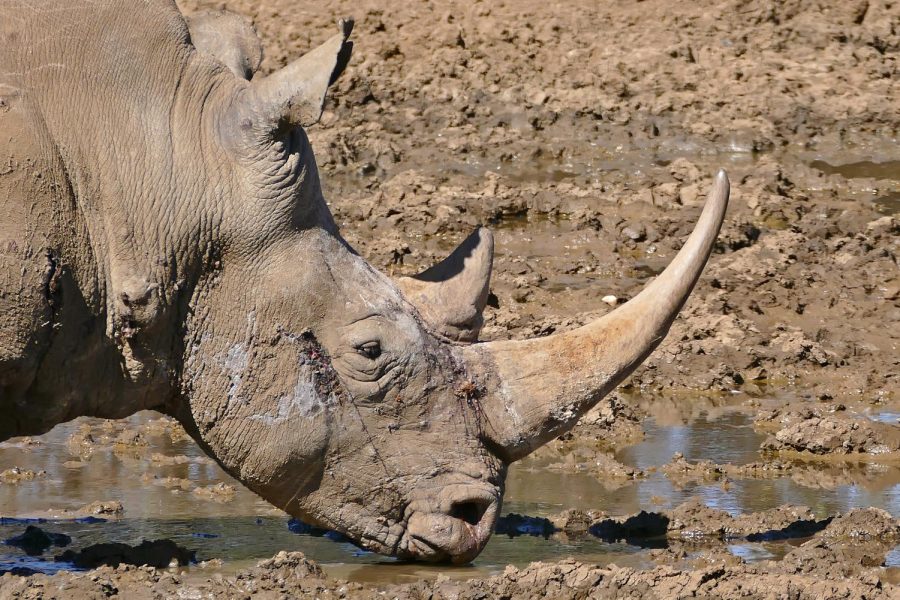Giba’s Claim: What’s worth caring about?
A white rhinocerous in South Africa.
Sep 28, 2021
Earlier in class this week, my professor brought up a somber photo of themselves with the last two white northern rhinos left in the world: Najin and Fatu (on World Rhino Day nonetheless). The efforts of scientists and conservationists to preserve their species over the past forty years have nearly dried up. There were four rhinos left, then three and now two –– both females. It’s almost certain (save for a last ditch plan involving preserving sperm and growing embryos) that they are destined to succumb to extinction.
Seeing those rhinos, I felt some pang of loss. The giants resonated with me, all docile and ancient. Spurred, I found a feature article from the New York Times that told their story. As I read along, I could feel the environmental conservationist stirring up within me. I discussed the dilemma of the rhinos with a friend, using the word “tragic” to explain my feelings. While she agreed with the tragedy of their situation, she brought up some constructive and valuable points: what about the hundreds of indigenous women missing in Wyoming, recently brought back to attention due to the recent Gabby Petito homicide? What about the gradual extinction of frogs in the Amazon critical to sustaining the rainforest’s ecosystem? Why did I care about these rhinos, becoming drawn to this cause, but these other issues flew under my radar? Whatever stokes stewardship for any cause is valuable in itself of course, but considering questions like these brought me out of my tunnel vision quickly.
Prompted by her points, I thought about these issues further throughout the day, trying to learn something from these stories. I thought about the Great Barrier Reef losing its life off the coast of Australia, the panda bears going extinct in China, the Pacific trash heap exponentially growing –– just more consequences human destruction. More locally, I walk along the Shaker Lakes sometimes and see they’re drained and feel remiss. Death and extinction happen each day invariably. I recognize that loss and understand its gravity, but, inevitably, like many of us, the loss may drift out of my mind until something like the rhinos comes up again. Something new to care about that I didn’t know. Of course this is natural and we don’t always carry the world’s problems with us while carrying our own, but global crises and significant stories are essential to recognize. Such recognition helps us remember our place in the human story: where we’ve been, what’s been lost, what’s worth hoping or fighting for.
I realized in reflection that I wouldn’t have necessarily mulled through about any of these other issues if I hadn’t learned about the rhinos that day. In a way, their story breathed further life into the simple act of caring for things outside of my own life (tied together with the nudge of a friend giving me the subtle reminder that it’s not just me, and it’s not just rhinos out here). It’s evident that our cares and opinions make up who we are, but thinking in this way caused me to wonder why we can care for things that may not necessarily be relevant to us, why we may become invested unexpectedly.
A concept I found productive as a vessel to explore these questions is the term psychological distance, a concept I’ll summarize as the degree to which people feel removed from an event (psychologically speaking). The distance we are from experiencing something in turn determines the value we place upon an event, which determines how much we care about something.
The world’s global temperature, for example, has been increasing unusually since the industrial revolution, clearly correlating alongside higher levels of carbon dioxide in the air, but no one can really feel that day to day. Cleveland’s in “second summer” right now, but the satire of oscillating Midwestern weather doesn’t exactly get the point across either.
What psychological distance is anchored to is the self in the present, and from there we must work outwards relatively. The causes we care about, then, at our core, are as psychologically close as it gets, meaning that generally we have some personal stake in an issue or have experienced something related to the event. It’s interesting to look at our worldview, in that understanding how psychologically close we are to something can help us measure how we see the world and consider what we truly care for.
I didn’t anticipate at any point to think so much about rhinos, or extinction, but here I am turning their near cessation of existence into my weekly column. Stories that don’t immediately seem relevant to our daily lives remind me how critical stories just like the white rhinos are. From such stories, reactions spawn. My reaction caused other issues arguably equally as important and relevant as extinction to be brought into my daily conscience.
While rhinos may not matter to you, and you could care less if they return to dust, consider the stories that may be out of your psychological distance. It is a question of awareness of the self, and where our cares lie that enables us to be more in tune with causes worth caring about. Ask yourself when dealing with the issues we face politically, socially, globally: “How close am I to this cause, and does that determine how much I care about it?”
We can’t care about everything, there’s far too much. But we can start asking ourselves: what is worth caring about?














Kristen Meissner • Nov 5, 2021 at 3:50 pm
Great article! You posed sensitive words and thoughts that sparked questions for me.
It opens another perspective of “what do I care about “ in a more abstract way of thinking!
I appreciate your words Mr. Giba!!